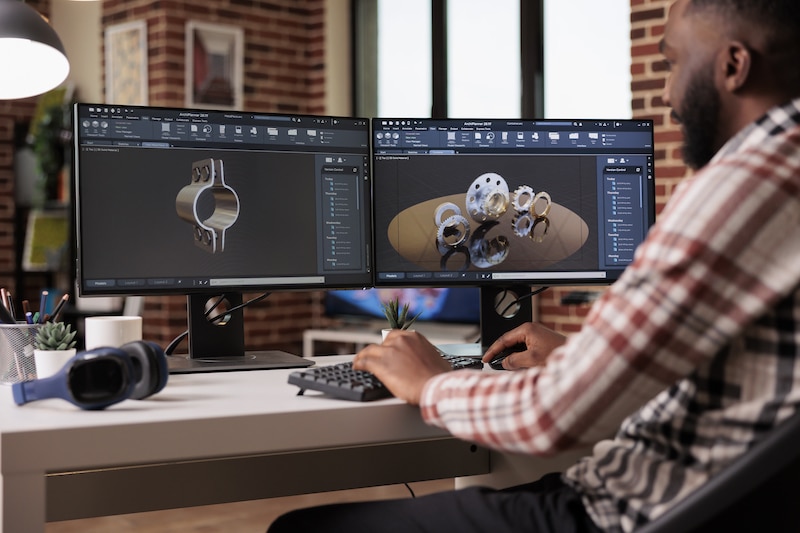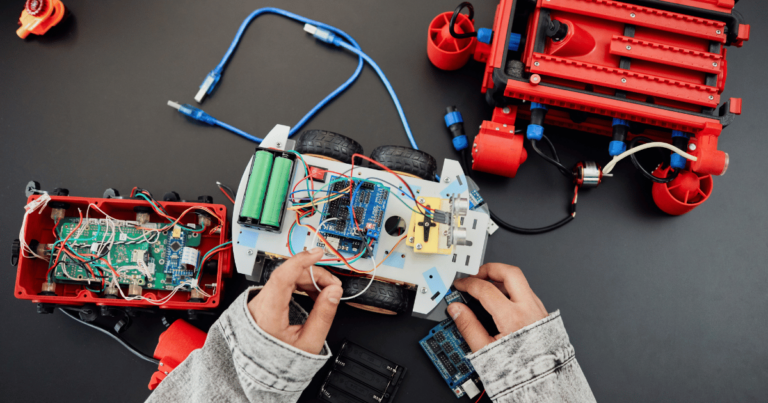Bringing a product to life requires more than an idea. From early specifications to production-ready plans, the journey is complex and multifaceted. Product engineering consultants can help businesses solve technical challenges, optimize design, and manage this complexity effectively. They guide companies through innovation, design, prototyping, development, testing, and deployment, ensuring a seamless transition from concept to market.
In today’s competitive market, the demand for rapid product launches and innovative solutions is higher than ever. Companies face numerous challenges, such as resource shortages and the need for specialized technical expertise. Outsourcing product engineering services offers businesses advantages like reduced costs, increased agility, and faster time to market. Leveraging the skills of product engineering consultants enables companies to navigate these challenges and achieve their goals more efficiently.
As we dive deeper into the world of product engineering consultants, we’ll explore when and why to engage these professionals, how they support end-to-end development, and the practical steps businesses can take to get the most out of this partnership. Whether you’re new to the concept or looking to enhance your existing processes, this guide will provide valuable insights to help you succeed.
Key Takeaways
- Product engineering consultants bring deep technical expertise that helps businesses navigate design, prototyping, and production challenges more efficiently, accelerating development timelines and improving outcomes.
- They play a critical role in improving product quality, reducing costs, and supporting smoother transitions into manufacturing by applying proven engineering practices and coordinating supplier readiness.
- The most effective consultants align with both your project goals and internal workflows, offering not just tactical support but long-term value through strategic thinking and cross-functional collaboration.
- Clear roles, shared goals, and open communication are essential for getting the most out of a consulting partnership and turning outside expertise into a measurable competitive advantage.
What Is a Product Engineering Consultant?
A product engineering consultant is a technical expert who helps businesses navigate the complex process of bringing a product from concept to production. Their work typically spans core areas like system architecture, design refinement, prototyping, and manufacturing readiness. Consultants are often brought in to supplement internal engineering teams, solve specific technical challenges, or help a company move faster when timelines or resources are tight.

What sets them apart is their ability to combine deep engineering expertise with cross-industry experience. Because they’ve worked on a wide range of products and platforms, consultants bring practical solutions and proven practices to the product development process, improving the quality of offerings and speed-to-market. They also help companies avoid costly missteps by identifying design flaws early, recommending more efficient production methods, and aligning product specs with business goals.
In addition to solving technical problems, strong consultants act as strategic partners. They contribute to innovation planning, optimize workflows, and support engineering efficiency by streamlining how teams collaborate across design, testing, and sourcing. For businesses that need to reduce costs, increase speed, or improve design outcomes, working with a consultant can be a cost-effective way to accelerate product development and deliver the right product to the right audiences.
How Product Engineering Consultants Support End-to-End Development
Product engineering consultants play a crucial role in guiding businesses through the entire product lifecycle, from initial concept to market launch. They ensure that every stage of development is seamlessly integrated with both engineering and market needs, providing comprehensive support that spans concept validation, iterative design, and manufacturing planning. This holistic approach helps businesses navigate the complexities of product development with greater efficiency and precision.
The following subsections detail how product engineering consultants support each stage of development. From validating concepts and conducting feasibility studies to refining designs and planning for production, these professionals provide invaluable insights and expertise that drive successful outcomes.
Concept Validation and Feasibility Analysis
One of the first steps in product development is ensuring that the concept is viable both technically and commercially. Product engineering consultants help teams define specifications, validate market assumptions, and conduct feasibility studies to avoid early-stage design risks. By evaluating the technical and market feasibility of a product idea, businesses can make informed decisions about whether to proceed with development.
A comprehensive feasibility study assesses risks, costs, and market potential, providing a clear picture of the project’s viability. This early-stage analysis is crucial for identifying potential obstacles and determining the best path forward. Leveraging the expertise of product engineering consultants ensures that product concepts are well-founded and have a higher likelihood of success.
Iterative Design, Simulation, and Prototyping
The iterative product design process is essential for refining product performance and ensuring that designs meet user expectations. Product engineering consultants use advanced engineering tools to simulate product designs, identify potential flaws, and optimize performance. This approach allows teams to address issues early in the development cycle, reducing the need for costly redesigns.

Prototyping is another critical aspect of the development process. Creating functional models allows teams to visualize and test features, ensuring the final product aligns with user needs and expectations. Product engineering consultants provide guidance and expertise throughout this iterative process, helping businesses achieve optimal design outcomes and streamline the path to production.
Manufacturing Support and Production Planning
Even the best product designs can run into trouble during production. Misaligned specs, missing documentation, or supplier miscommunication can lead to costly delays or quality issues. A product engineering consultant helps prevent these problems by translating engineering intent into clear, actionable production plans, ensuring that what gets built matches the design vision, budget, and performance requirements.
- Design for Manufacturing (DFM): Consultants apply DFM principles to simplify designs, reduce part complexity, and ensure compatibility with manufacturing processes. This helps avoid production bottlenecks, minimize tooling costs, and improve yield.
- Sourcing Input: They evaluate material choices and suggest alternatives based on availability, cost, or regional constraints. This guidance helps businesses make smart trade-offs that balance performance and price.
- Vendor Coordination: A consultant often acts as a technical liaison between your internal team and external suppliers or factories. They clarify requirements, answer production questions, and help ensure supplier alignment during sample runs and early builds.
- Bill of Materials (BOM) Reviews: The BOM is a detailed list of every part, component, and material needed to build your product. Consultants review BOMs to eliminate errors, spot cost-saving opportunities, and confirm that everything aligns with the intended design and sourcing plan.
- Pre-Production Quality Controls: Before full-scale manufacturing begins, consultants help establish inspection protocols and quality benchmarks. This reduces the risk of defects and supports a smoother factory ramp-up.
Why Businesses Rely on Product Engineering Consultants
For many companies, product development demands move faster than internal teams can handle. Engineering consultants help fill those gaps — offering focused expertise, flexible capacity, and real-world experience that strengthens both technical outcomes and strategic decision-making. Here are three key reasons why businesses turn to product engineering consultants:
Accelerated Timelines Without Sacrificing Quality
Consultants help teams move faster by avoiding trial-and-error cycles and making technical decisions with confidence. Their experience allows them to spot risks early, reduce back-and-forth during prototyping, and support faster transitions from design to production. For companies trying to meet tight launch deadlines, this added speed can be a game-changer.
Cost Control and Efficiency
Engaging product engineering consultants allows businesses to manage costs more effectively, as they only pay for the services when needed. This approach helps prevent expensive missteps through design optimization and rigorous testing, ensuring that resources are used cost-efficiently. Effective design strategies also help minimize waste during the manufacturing phase, further reducing costs.
Improved Product Quality
Consultants use proven engineering practices to ensure better product durability, functionality, and long-term performance. From quality assurance planning to compliance checks, their support helps companies launch the right products that meet both customer expectations and industry requirements — and that are built to scale.
Choosing the Right Product Engineering Consultant
Selecting the right product engineering consultant is crucial for effective collaboration and successful project outcomes. It’s important to choose a consultant who not only meets project needs but also complements your company culture. Evaluating their ability to integrate with your existing processes and teams is essential for ensuring a smooth and productive partnership. Here are some things to evaluate when choosing the right partner:
Technical Expertise and Industry Background
Look for consultants who have hands-on experience with the type of product you are building, whether that involves specific materials, manufacturing processes, or regulatory requirements. Industry familiarity helps reduce ramp-up time and ensures they can anticipate common challenges before they become costly problems.
Strategic Thinking and Business Alignment
A successful product engineering consultant should align their strategies with your business objectives for optimal outcomes. This means looking beyond isolated tasks and contributing to the overall strategic objectives of the product. Consultants should integrate their efforts with your broader business goals, ensuring that their work supports your long-term vision and growth.

Choosing a consultant who understands your business strategy and aligns their efforts accordingly ensures that their contributions are meaningful and impactful. This strategic alignment is key to achieving successful product development and driving business success through an innovation strategy.
Communication and Working Style
Effective communication and a compatible working style are essential for a successful collaboration with a product engineering consultant. Assess how well they work with your internal team, suppliers, or external design partners. Inquire about their methods for tracking project milestones, documenting progress, and handling feedback loops.
Evaluate their methods for engaging with various stakeholders and communicating updates throughout the project’s lifecycle. A consultant who can effectively manage project updates and maintain clear communication will ensure that everyone is on the same page, contributing to a smoother and more productive development process.
How to Get the Most Out of a Consulting Partnership
To get the most value from your consultant, structure the relationship with clear expectations, shared accountability, and a process that keeps communication open. These best practices can help teams stay aligned and keep product development on track.
- Define your goals early: Agree on the project scope, target outcomes, and how success will be measured. Whether you are optimizing for performance, cost, or time to market, clarity from the beginning leads to better execution.
- Clarify who owns what: Assign responsibility for key deliverables, including technical decisions, documentation, supplier communication, and testing. Clear ownership helps avoid confusion and keeps the project moving.
- Set up regular communication: Check-ins tied to project milestones help surface issues before they escalate. Use these meetings to review progress, adjust priorities, and confirm next steps.
- Capture everything in writing: Well-documented decisions, changes, and approvals reduce backtracking and support faster handoffs. A consultant who values process will help you stay organized and informed.
- Treat your consultant like a strategic partner: Invite them into high-level conversations and share context beyond the immediate task. The more insight they have into your business goals, the more useful their recommendations will be.
Engineering Confidence Into Every Stage of Product Development
Launching a product takes more than a strong idea. From design feasibility to manufacturing handoff, businesses need the right technical guidance to navigate complexity and avoid costly delays. A product engineering consultant helps fill that gap, offering targeted expertise, greater flexibility, and a direct path to better outcomes.
Gembah connects businesses with engineering consultants who specialize in turning product concepts into cost-efficient, production-ready solutions. Our team supports every stage of development, from early design to factory coordination, so you can move faster, reduce risk, and deliver products that meet both performance and market demands. With the right support, your team can bring better products to life with more clarity and confidence.
Frequently Asked Questions
What does a product engineering consultant do?
They support product development from concept to production, helping teams solve technical challenges, optimize design, and reduce delays.
When should a business bring in a product engineering consultant?
The earlier, the better. Ideally, during concept validation or initial design, key decisions can shape cost, speed, and quality.
What should a business expect when working with a product engineering consultant?
Expect hands-on support with design, prototyping, and production planning, along with clear communication and alignment on goals and timelines.
How is a consultant different from a design firm or internal engineer?
Consultants bring targeted expertise and outside perspective, while firms focus on visuals and internal teams manage day-to-day execution.
What kind of businesses benefit most from hiring a consultant?
Startups and growing companies benefit most, especially those launching complex products or needing extra support to move faster and reduce risk.


